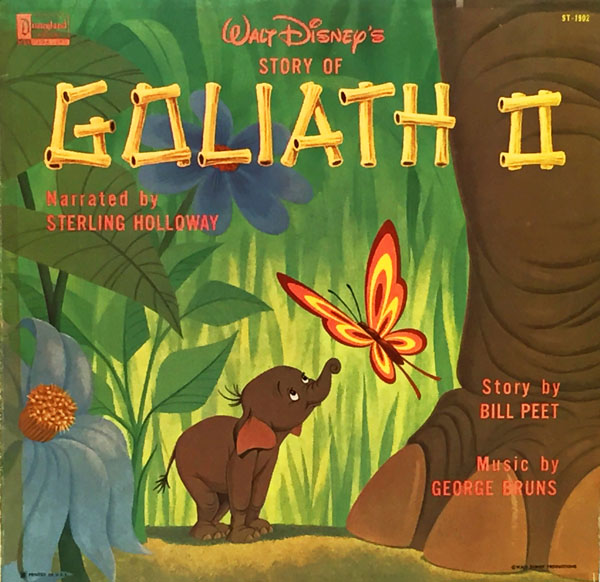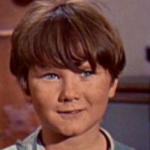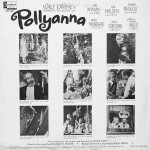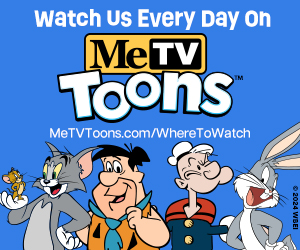A look at the vinyl version of the first Disney short to use the Xerox process and pay tribute to Disney Legend Kevin “Moochie” Corcoran, who passed away last week.

Walt Disney’s Story of
GOLIATH II
Narrated by Sterling Holloway
Disneyland Records – Storyteller Series ST-1902 (12” 33 1/3 RPM LP)
Released in 1960. Executive Producer: Jimmy Johnson. Producer: Camarata. Story: Bill Peet. Music: George Bruns. Running Time: 18 minutes.
 The 1960 short Goliath II was theatrically released along with a live-action Disney adventure called Toby Tyler, Or Ten Weeks With The Circus. Playing the lead in both films was Kevin Corcoran, who was already a well-known young Disney star. Walt himself gave him a role on The Mickey Mouse Club serial, The New Adventures of Spin and Marty. Soon after, he was everywhere in Disney films and TV, nimbly handling supporting or starring roles in the late ’50s and early ’60s.
The 1960 short Goliath II was theatrically released along with a live-action Disney adventure called Toby Tyler, Or Ten Weeks With The Circus. Playing the lead in both films was Kevin Corcoran, who was already a well-known young Disney star. Walt himself gave him a role on The Mickey Mouse Club serial, The New Adventures of Spin and Marty. Soon after, he was everywhere in Disney films and TV, nimbly handling supporting or starring roles in the late ’50s and early ’60s.
Goliath II is not a short that comes up often in Disney retrospectives, nor is Corcoran given a nod for providing the voice for an historic film. True, Goliath II isn’t the most memorable little film (it’s essentially an ugly duckling story), but it doesn’t try to be. Directed by Wolfgang Reitherman, it’s an easygoing diversion with superb character animation, lush design and the wonderful narration of Sterling Holloway.
It was also an experiment in the use of photocopying animation cels to save the expense of hand-inking them, a process that led to its use in 1961’s 101 Dalmatians and beyond. The film can also be linked directly with 1967’s The Jungle Book, sporting some very similar designs—and most notably, two elephant pile-ups.
Bill Peet wrote the story and was involved with other aspects of Goliath II. For example, the mouse that taunts Goliath looks exactly like Peet’s mice on the 1957 record, Walt Disney’s Christmas Concert [All-Mouse Orchestra). The sketches on the back cover of the album bear his distinctive stamp.
Kevin Corcoran does not appear on the Disneyland Records version (see below for an album upon which he does). Sterling Holloway, who narrated the most Disney LP’s of any other actor (Robie Lester holds the record for the most Disney vinyl of any size and speed), is the only voice on the disc, proving once again why he’s such a deft master of making every word count. As Disney records moved into the 1960s, soundtrack background music became less frequent, so it is a treat to hear George Bruns’ fine music backing up Holloway’s narration on this disc.
However, there are some odd things about how the story is told without the film’s visuals. In the film, Goliath falls into a mud puddle as the elephants march off without him. Within seconds, his mother (Barbara Lo Allen, Fauna in Sleeping Beauty) notices and calls a halt and the elephants crash into each other.On the record, there’s a march and there’s a crash with no explanation. Even stranger, when Raja (a ravenous lion who is more of a Pete Puma than a Shere Khan) falls into the crocodile’s mouth, he escapes, but on the record, apparently he just dies because there’s no mention of an exit.
Goliath II was one of the few Disneyland Storyteller “ST” albums to be packaged without a book. So was the Pollyanna album, listed below, but it was reissued as a “DQ” catalog title, as was 101 Dalmatians .
GIVE A LITTLE LISTEN
Opening Excerpt from “Goliath II” LP
The album begins exactly as the film did, right down to the Buena Vista fanfare (usually absent from early Disney vinyl records). Sterling Holloway’s narration was recorded especially for the record so the words could allow description in the absence of visuals.

Walt Disney Presents the Story of
POLLYANNA
Narrated by Kevin Corcoran as Jimmie Bean
Disneyland Records – Storyteller Series ST-1902
Reissue: DQ-1307 (12” 33 1/3 RPM LP / Mono)
Kevin Corcoran narrated a handful of Disney albums, including Swiss Family Robinson (which contained no soundtrack dialogue) and this one (which includes some of the best live-action performances Disneyland Records ever pressed on to vinyl records.Released in 1960. Screenwriter/Director: David Swift. LP Executive Producer: Jimmy Johnson. LP Musical Direction: Camarata. Music: Paul J. Smith. Choir Director: Bob Mitchell. Running Time: 40 minutes.
Soundtrack Dialogue Cast: Hayley Mills (Pollyanna); Jane Wyman (Polly Harrington); Karl Malden (Reverend Ford), Adolphe Menjou (Mr. Pendergast); Agnes Moorehead (Mrs. Snow); Kevin Corcoran (Jimmie Bean); Gage Clarke (Mr. Murg).
Songs: “Pollyanna’s Song” by Paul J. Smith, David Swift; “The Glad Game” by Gil (Hazel) George, Paul J. Smith; “America the Beautiful” by Katherine Lee Bates, Samuel A. Ward.
The consensus is that Walt Disney should have changed the title of Pollyanna to something like “Harrington Town” because many have mistakenly dismissed this 1960 classic as a treacly vat of goo. It’s certainly heartwarming, but not in a mawkish, self-conscious way. Populated by a stellar cast, it earned Hayley Mills a special Oscar and is considered one of Walt Disney’s all-time best live-action movies.
David’s Swift’s script is so good, as is the acting, that this album accomplishes the daunting feat of editing down the dialogue 134-minute movie (it took three Wonderful World of Color hours to show it on TV) to a 40-minute audio experience. One wonders if Swift had a role in producing the album, or perhaps consulted with Jimmy Johnson on its script.In place of actual soundtrack music, the Paul J. Smith score is represented on this record by several passages played by a small orchestra with strings; it’s certainly not the rich sound of the film, but it suffices nicely. The album opens with Mills singing “Pollyanna’s Song” and concludes with what is unmistakably the Bob Mitchell Choir (Peter Pan, Going My Way, The Flying Nun). It must be admitted that, despite some lyrics by David Swift, these pleasant songs are the marshmallow Peeps that the movie avoided, but the star of this album is the infinitely listenable dialogue, delivered by some of Hollywood’s best.
GIVE A LITTLE LISTEN
The Bazaar Scene from the “Pollyanna” LP
The Bazaar sequence is important to the film as an emotional bridge, allowing the audience to see the changes Pollyanna has brought to the town. Her influential Aunt has forbidden her and the citizens to participate, so there is an undercurrent of defiance, part of the film’s subtle edge, to be followed by much drama. Kevin Corcoran’s narration does not deal with the nuances, of course, but this is a good example of how comfortable he was in front of a microphone.






 GREG EHRBAR is a freelance writer/producer for television, advertising, books, theme parks and stage. Greg has worked on content for such studios as Disney, Warner and Universal, with some of Hollywood’s biggest stars. His numerous books include Mouse Tracks: The Story of Walt Disney Records (with Tim Hollis). Visit
GREG EHRBAR is a freelance writer/producer for television, advertising, books, theme parks and stage. Greg has worked on content for such studios as Disney, Warner and Universal, with some of Hollywood’s biggest stars. His numerous books include Mouse Tracks: The Story of Walt Disney Records (with Tim Hollis). Visit 





















































I recall Corcoran’s complete record narration was included in the 2-disc “Pollyanna” DVD set.
I also enjoyed Smith’s score in that film especially the instrumental version of Pollyanna’s song that is featured throughout the film (I always thought the song worked better that way).
Hi Nic,
Yes, I think you’re right about the special edition DVD having the album and about the wonderful Paul J. Smith score.
As you stated, “Pollyanna Song” and “The Glad Game” are based on a melody in the film. Hayley Mills also recorded a song called “Jimmie Bean” that used the main title music.
“Pollyanna Song” and “Jimmie Bean” are included on Hayley Mills’ “Let’s Get Together” album which can be downloaded on iTunes:
https://itunes.apple.com/us/album/lets-get-together-hayley-mills/id156086649
Do enjoy Bill Peet’s work in children books that resembles the mouse here. However I never cared for this cartoon for the same reason I didn’t ROBIN HOOD, mostly because the recycling of old animation from earlier features and shorts is too-TOO obvious. Yes, you also see some “lifting” in even a classic like 101 DALMATIANS (like canines from LADY AND THE TRAMP) but it takes a couple viewings to catch them. In this one, you are like… “oh there’s Friend Owl from Bambi’s forest!” and “there’s one of Dumbo’s neighbors from the circus!” Of course, there is still some nice original personality animation here and I do think Kirk’s vocals are also fitting the character. It is just not one of those cartoons you should not see SOON after watching a popular feature favorite. Now that I know that JUNGLE BOOK even borrowed a bit here, I guess GOLIATH’s stock has gone up a bit for me in terms of originality.
Watch and you’ll see two very different owls, one from “Sleeping Beauty” and one from “Bambi.” The croc looks familiar from “Peter Pan”; Goliath II being hugged by his mother’s trunk was at least inspired by “Dumbo”; and I’m wondering if that bird catching eggs (used twice; flipped the second time) is descended from the bird yelling at Alice in “Alice in Wonderland.”
Recycling is a proud old Hollywood tradition. MGM’s Tarzan movies recycled everything from odd individual shots to entire sequences; Universal would recycle monster stunts and effects from earlier films; Roy Rogers kept all his old cowboy shirts so they could match him to stock footage; late period Stooges could be old routines with a few new connecting scenes; and Abbott and Costello’s “In Society” ends with a big car chase lifted from a W.C. Fields movie.
As for animation, Warner recycled some animation (“Toonheads” put a few examples together) and plenty of gags (although old gags were usually reanimated); Famous/Paramount recycled the Fleischer two-reelers; and Walter Lantz recycled girls and dancers in the musical shorts.
I am a judgmental SOB, ain’t I? Many short subjects in particular, both animated and live-action, recycled constantly (a.k.a. Three Stooges style). We modern movie buffs who have so much available for re-watching notice it more than the movie-goers “back then”, of course.
Perhaps those who had not seen Disney’s “Pollyanna” had assumed it to be sappy because of the character’s reputation – her name had become a synonym for “incurable optimist.” There had been a whole series of Pollyanna books (by the original author and at least two successors) and even a board game.
It’s a distinct advantage for David Swift to have done the film. Swift was something of an expert at handling overly nice characters without drenching them in saccharine – he was creator/writer of the “Mr. Peepers” sitcom starring Wally (Underdog) Cox.
Not to mention her far more artificial cousin, Pollyesther… (ouch, owww, oof)